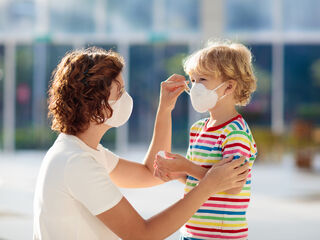Coronavirus Disease 2019
Who Cares If I Wear a Mask?
Mask wearing as a sign of caring.
Posted August 4, 2020 Reviewed by Jessica Schrader
By Michelle M. Robbins, Ph.D., on behalf of the Atlanta Behavioral Health Advocates

I wonder why wearing masks is even an issue during this global pandemic. I mean, I get that they are not the most comfortable things to wear, especially relative to my recent attire of yoga pants and T-shirts. In the South, where summer temperatures rise above 90 degrees, masks are especially unpleasant!
They are hot. They make me sweat, contributing to acne at an age that should be beyond such adolescent remembrances. The one made lovingly by my sister in Massachusetts, delightful in its vibrant pink colors, gets strands of my hair caught up in its ties every time I wear it. Other ones bother my ears after a time. I have to talk louder in them than I normally would, which exacerbates the heat from my warm breath seemingly trapped inside the mask. I know I breathe just fine with the mask on (even with my mild asthma), but it feels like I don’t, and I always have immense relief the moment I can pull it from my face, when I am safely in my car or far enough away from others. So, let me be clear...I don’t like wearing a mask. If it were up to me, I wouldn’t wear one ... except, I guess, unless it’s mandated, it actually is up to me. And I do wear one, every time I go out in public.
This got me thinking. I generally have a choice to wear a mask, and I hate the mask but still choose to wear it. Every time. One time I walked a block away in the sweltering heat to drop off a package at UPS, realizing just as I got there that I had forgotten my mask! I returned home with the package in hand. Why would I wear a mask I can’t stand if it were entirely my decision? Why does anyone do something they don’t want to do? In this case, the evidence is overwhelming that wearing a mask in public around other people is effective to reduce the transmission of COVID-19. So, I wear the mask because I know it will reduce the likelihood of people—me and others—contracting COVID-19.
And in the midst of a global pandemic unlike the world has seen in over 100 years, why would people not willingly do what they can to reduce the risk of transmission?
I mean, yes, it’s an annoyance and inconvenience to wear a mask. Other than a brief moment when it’s almost a tiny bit fun to choose which color mask I’ll wear when heading out (eventually accepting that few of my masks match anything I’m wearing well), there is very little pleasurable about wearing a mask.
So why do I do it? Oh, yes, to reduce the spread of COVID-19, to flatten the curve, to do my part to keep people well.
Why would everyone not make that same decision?
Perhaps some people cannot wear them due to medical conditions, but medical experts are clear that if people are well enough to be out in public, they are capable of wearing a mask. So, if your asthma or other medical condition prevents you from wearing a mask, then you probably aren’t well enough to be out in public anyway. So, that can’t be it. And if you have a condition like autism spectrum disorder or a sensory processing difficulty, it may be challenging to wear a mask. But, surely the numbers of people with those difficulties don’t account for the masses of people choosing mask refusal.
There is another argument about individual rights, which falls under the “you can’t make me wear a mask; this is a free country” argument. And it’s a good one, in my opinion. After all, our Declaration of Independence stated that Americans would have “unalienable Rights, that among these are Life, Liberty and the pursuit of Happiness.” It makes sense, then, that people may not wear a mask because they’re exercising their liberty, their freedom of choice.
Still, two things puzzle me about this argument. First, if we each have the right to both “Life” and “Liberty,” how do we reconcile one person’s right to “Liberty,” or choice not to wear a mask, with someone else’s right to “Life,” to not get exposed to a virus that could cause severe illness or death? This is perhaps a philosophical debate better left to political and historical scholars than me. I am, after all, a psychologist.
The realm of the psychologist emphasizes empathy and caring, two of my town’s public school’s core values. The cornerstone of any relationship involves caring, which leads to my second puzzled reaction. Despite my own discomfort and right to “Liberty,” I wear a mask because I care about others, even strangers. I care about others’ well-being and so choose to prevent unintentionally, unknowingly exposing someone else to an illness that may cause irreparable damage or death to them or their loved ones. I don’t understand why everyone would not make this choice. If someone refuses to wear a mask, is it because they do not care about others or even themselves?
Every loving parent knows you have to sacrifice some of your own comfort for that of your children. When you love someone, you put their needs ahead of your own. When you care about your fellow human beings during a pandemic, you wear a mask. But caring about others is a learned skill. Just as hurting people hurt others, people who have been cared for care for others. Parents raising children to care about the well-being of everyone teach them to wear masks.
So, wearing a mask says you care about others enough to prioritize the needs of everyone in the community. Mask-wearing behavior thus indicates an inner quality, that of caring. When you see people without a mask—however defiant or nonchalant they may be—perhaps no one cared for them enough to teach them to care for others. And that makes me sad for them personally, as much as I worry about their potential endangerment of us all.
People can change, and please don’t let that change only come after you’ve had a personal loss! Even if you think it won’t matter or that COVID-19 is a hoax, what if you’re wrong? Let’s all work together to rewrite the narrative that wearing a mask isn’t about your rights or my politics … it’s about health and humanity. Wearing a mask just means you care about me, just as I care about you. We are undeniably in this together.




